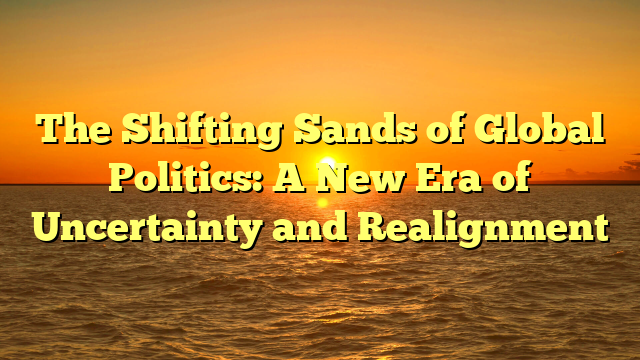In mayong77 , global politics is undergoing a profound transformation. From the rise of populism to increasing geopolitical tensions and climate-induced migration, the international landscape is marked by uncertainty, fragmentation, and a growing distrust of traditional institutions. This shift isn’t simply a phase—it reflects deeper changes in power dynamics, public sentiment, and global governance.
One of the most notable political trends of the past decade has been the rise of populist leaders and movements. Whether it’s in the United States, Brazil, Hungary, or India, populist leaders have tapped into widespread frustration with the political elite, globalization, and economic inequality. These leaders often position themselves as the voice of the “common people” against a corrupt or out-of-touch establishment. While they vary ideologically, their approaches often share an emphasis on nationalism, anti-immigration rhetoric, and skepticism toward multilateralism.
At the same time, democracy itself is being tested. According to Freedom House, global freedom has declined for more than 15 consecutive years. In several countries, authoritarianism is tightening its grip, and even established democracies are showing signs of democratic backsliding. Attacks on judicial independence, press freedom, and electoral integrity have become more frequent. As digital tools become more powerful, governments—both democratic and authoritarian—are using them to control narratives and influence public opinion through surveillance and disinformation.
Geopolitically, the balance of power is also shifting. The United States, long the dominant global power, faces growing challenges from an increasingly assertive China and a resurgent Russia. The war in Ukraine, for example, has not only caused immense human suffering but has also redrawn alliances and forced NATO to reconsider its strategic posture. Meanwhile, China’s Belt and Road Initiative and assertive stance in the South China Sea demonstrate its ambition to reshape global institutions and regional influence.
In this environment, international cooperation has become more difficult—but also more essential. Climate change, pandemics, and economic instability are transnational challenges that no country can solve alone. Yet, multilateral organizations like the United Nations and World Health Organization are often undermined by competing national interests and funding constraints. The COVID-19 pandemic revealed the weaknesses of global cooperation, as countries raced to secure vaccines and closed borders, often without coordination.
Technology, too, plays a double-edged role in contemporary politics. On one hand, it has democratized access to information and enabled civic engagement. On the other, it has facilitated the spread of fake news, polarization, and cyber warfare. Social media platforms, once heralded as tools of liberation during events like the Arab Spring, are now criticized for enabling echo chambers, hate speech, and foreign interference in elections.
Despite these challenges, there are also signs of resilience and innovation in the political sphere. Civic movements—ranging from climate activism to pro-democracy protests—have shown that people around the world are willing to organize, mobilize, and demand accountability. Countries like New Zealand and Finland have demonstrated that inclusive governance, transparency, and forward-thinking leadership can still flourish.
Looking ahead, the future of politics will likely be shaped by how societies respond to crises and whether institutions can adapt to meet new demands. Political polarization, the climate crisis, and economic inequality will continue to test the social fabric of nations. But there is also potential for reform, renewal, and cooperation—if leaders choose to listen, innovate, and lead with integrity.
In a world increasingly defined by division, the ability to foster inclusive dialogue, uphold democratic values, and promote cooperation across borders may be the most important political challenges—and opportunities—of our time.
The Shifting Sands of Global Politics: A New Era of Uncertainty and Realignment


